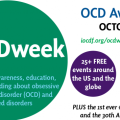To tweet or not to tweet (aka, keeping private things private in the Facebook/Twitter era)
Social media tools like Facebook and Twitter are poised to revolutionize healthcare. Social media sites can be useful for quickly disseminating health-related information and giving users a place to connect around shared interests. In some cases, online support communities have supplanted the traditional support group model. In other cases, social media tools are actually being adapted for treatment purposes (e.g., anxiety treatment via social media tools).
As helpful as these sites might be, however, they pose potential privacy risks for users. Users respond to these risks in very different ways. There is a category of folks who openly blog/tweet/post status updates related to their anxiety and other mental health concerns, and there are those who would much rather keep this information private. Nowhere is this more apparent than on Twitter, where you can get a virtual minute-to-minute (or, in some cases, second-to-second) account of the trials and tribulations faced by individuals throughout their days.
Although some people lock down their Twitter accounts and must approve all new followers, I consider Twitter to be a fairly open medium. On Facebook, however, most people only share status updates with their friends. Some people make use of Facebook lists, of course, which allows selective sharing of information, but most people I know don’t utilize this feature. Tools like Google+ seemingly make it easier to broadcast different messages to different circles of friends, which I think lends itself better to blogging about one’s own mental health; however, some inherent privacy issues still remain.
There are also other online communities that have been built explicitly around a support-group type model, but despite the large number of members who belong to these sites, most individuals I know don’t frequent them.
I am wondering where you stand on these issues. What have your experiences been like when using Facebook, Twitter, or other communities to talk about mental health topics? Are you concerned about privacy when using these tools?
Please sound off in the poll below or leave a comment.
Thanks!
(Given the nature of this topic, feel free to leave anonymous comments with made up names/email addresses if you wish. Just note that if you use a fake email address, you won’t receive updates when others reply to your comments).
**Note: This poll is now closed.**
Want Updates about New Content?
Follow Me!
Follow @drstevenseay













I think it is important to have common sense and self analyze your language before you post something on social media. Hurtful words can hurt people in different ways and we must all use respectful language when communicating with others on Facebook, Twitter etc. On social media I use language that I feel is appropriate and will not hurt others in any way because I do believe that words can hurt people. We must all express our opinions on different topics and issues on social media but we must be smart while doing it. We have to understand that not everyone shares the same opinions as everyone else whether it is politics or religion.
Great article.